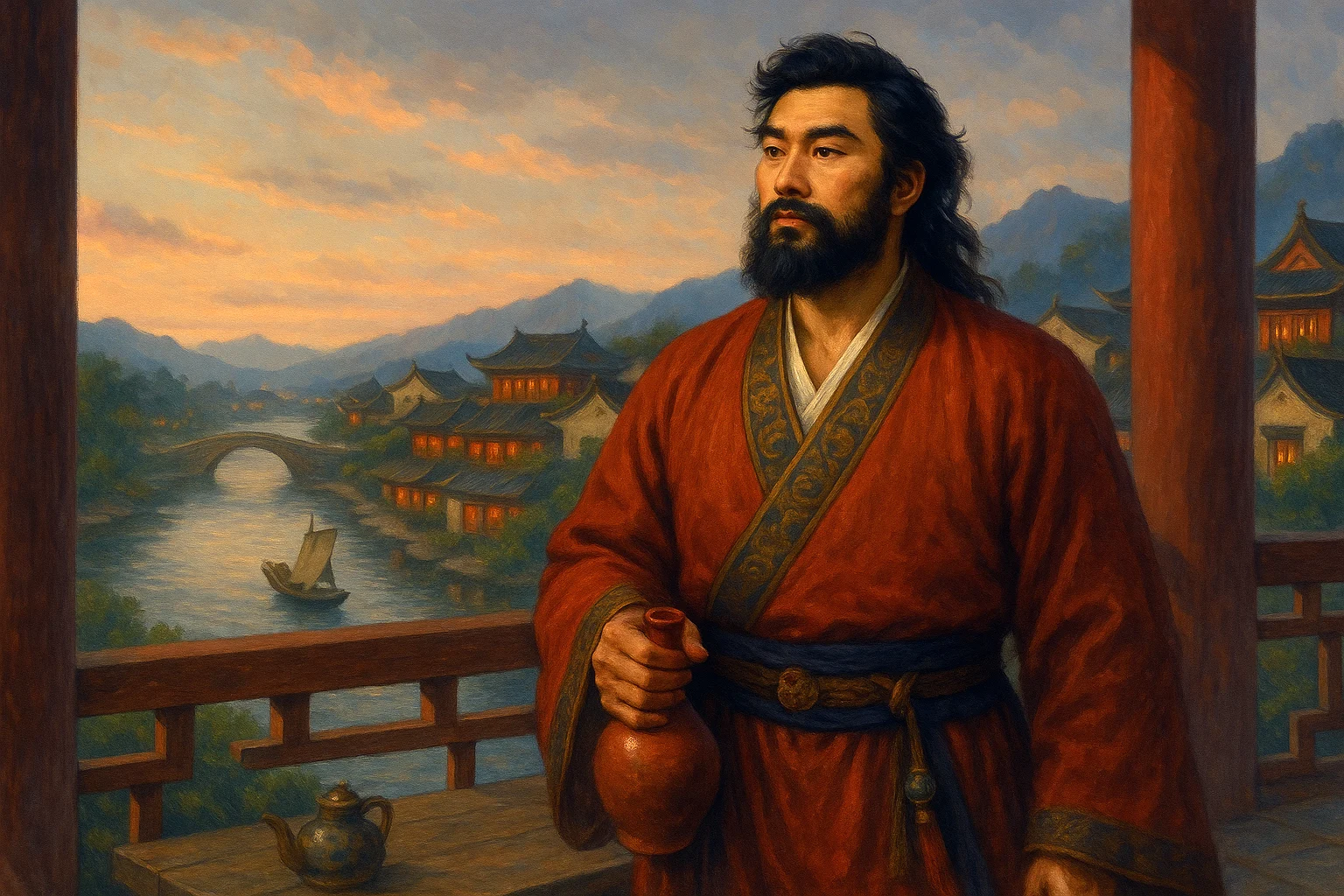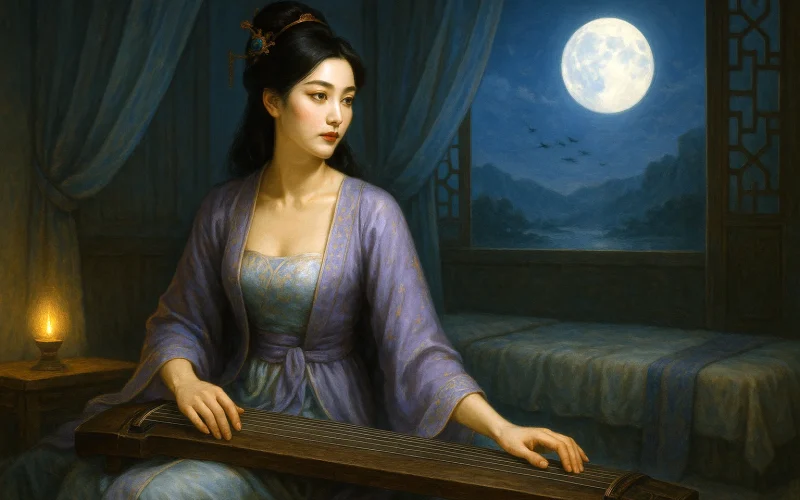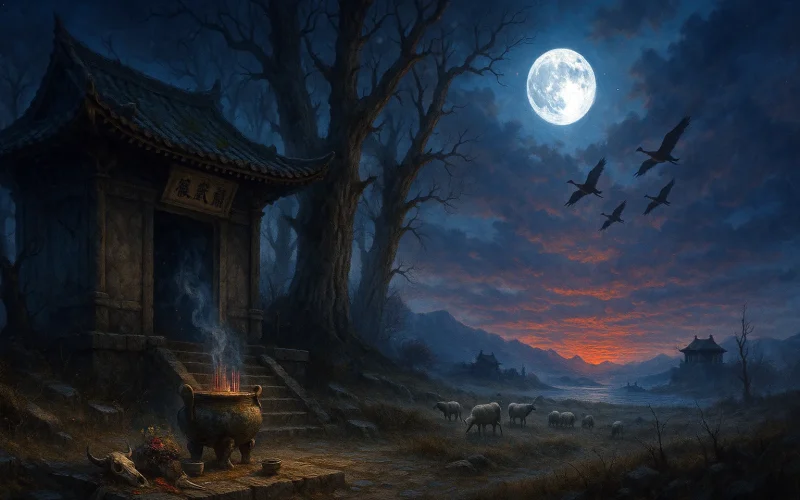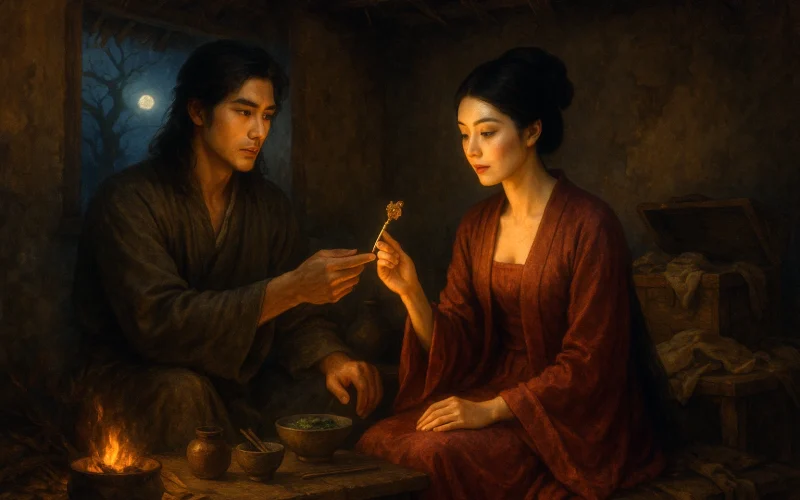A cool-matted silvery bed; but no dreams...
An evening sky as green as water, shadowed with tender clouds;
But far off over the southern rivers the calling of a wildgoose,
And here a twelve-story building, lonely under the moon.
Original Poem
「瑶瑟怨」
温庭筠
冰簟银床梦不成,碧天如水夜云轻。
雁声远过潇湘去,十二楼中月自明。
Interpretation
This poem comes from the renowned late Tang poet Wen Tingyun, celebrated for his graceful lyric poetry. "Lament of the Jade Zither" stands as a quintessential example of his boudoir-plaint poetry. Through delicate depictions of autumn nightscapes and distant geese calls, the poem portrays a sleepless woman yearning for her absent beloved, her emotions adrift without anchor. With exquisite diction and lingering emotional resonance, it represents a masterpiece of late Tang romantic poetry.
First Couplet: "冰簟银床梦不成,碧天如水夜云轻。"
Bīng diàn yín chuáng mèng bù chéng, bì tiān rú shuǐ yè yún qīng.
On chilled bamboo mat and silver bed, no dreams will form;
Jade-clear night sky like water, drifting clouds light and warm.
The couplet begins with the woman's dreamless solitude, perfectly blending environmental description with inner emotion. Dreams should offer emotional solace, yet even dream-meetings prove impossible, revealing profound longing and emotional desolation. The ethereal nightscape ironically underscores her heavy, melancholy heart.
Second Couplet: "雁声远过潇湘去,十二楼中月自明。"
Yàn shēng yuǎn guò Xiāo Xiāng qù, shí èr lóu zhōng yuè zì míng.
Goose cries fade southward toward Xiao-Xiang streams;
In twelve-tiered tower, the moon alone beams.
Geese traditionally carry love letters; their distant cries stir longing for the faraway beloved. The place-name Xiao-Xiang intensifies the separation's vastness. "The moon alone beams" suggests nature's indifference to human sorrow - the unchanged moonlight highlighting the woman's isolation. The universal moonlight finds no shared appreciation, the unspoken grief resonating deeply.
Holistic Appreciation
Rather than direct lamentation, the poem conveys a woman's nocturnal yearning through cool scenery and distant sounds. Wen Tingyun masterfully depicts boudoir melancholy with refined language, creating ethereal beauty. Though physically absent, the woman becomes vividly present - her emotions, figure and solitude all expressed through nightscapes and geese calls. From dreamless rest to fading geese cries and finally solitary moonlight, emotions deepen progressively like rippling water.
The twelve-tiered tower symbolizes both the beauty's lofty residence and her spiritual isolation. Moonlit yet increasingly disconnected from the world, she becomes one with the silent night, her sorrow merging with the boundless moonlight.
Artistic Merits
Wen Tingyun demonstrates late Tang boudoir poetry's quintessential style through delicate language, symbolic imagery and subtle conception. The poem features rigorous structure, perfect parallelism and natural coherence. Technically, "dreamless nights" convey inner turmoil while "light night clouds," "distant geese" and "solitary moon" create vast spatial and temporal silence. Emotion arises from scenery, scenery responds to emotion - achieving an artistic effect where reality and imagination, distance and proximity intertwine. Visual stillness combines with auditory movement, enhancing emotional transmission. The poem's restrained elegance leaves readers lingering in contemplation, standing among Wen's finest works.
Insights
This poem mirrors profound emotion through cool scenery, revealing the poignant beauty of feelings flowing silently through time and space. Without verbal complaint, the woman's unfulfilled dreams, the geese's vanishing cries and the tower's lonely moonlight construct emotional depth. It teaches us that true feeling often speaks most movingly through silence, and that poetry's charm lies precisely in this resonance between suggestion and ethereality. Reading such poetry becomes not just historical empathy, but quiet contemplation of our own inner worlds.
Poem translator
Kiang Kanghu
About the poet

Wen Ting-yun (温庭筠) was a native of Qixian County, Shanxi, circa 813-870 AD. Wen Tingyun was a professional writer of late Tang Dynasty lyrics, whose achievements and influence were greater than that of poetry, and was once known as the “originator of the flowers”.












